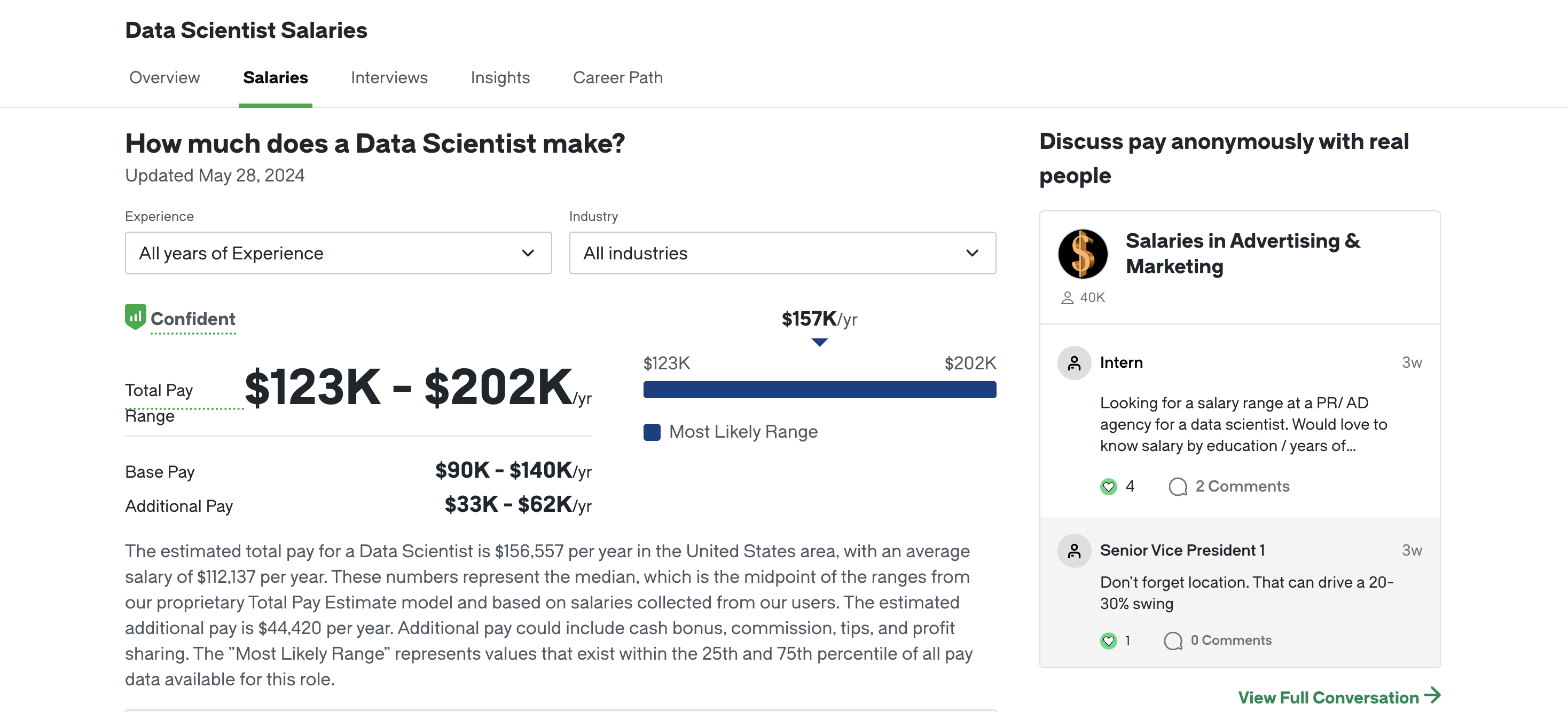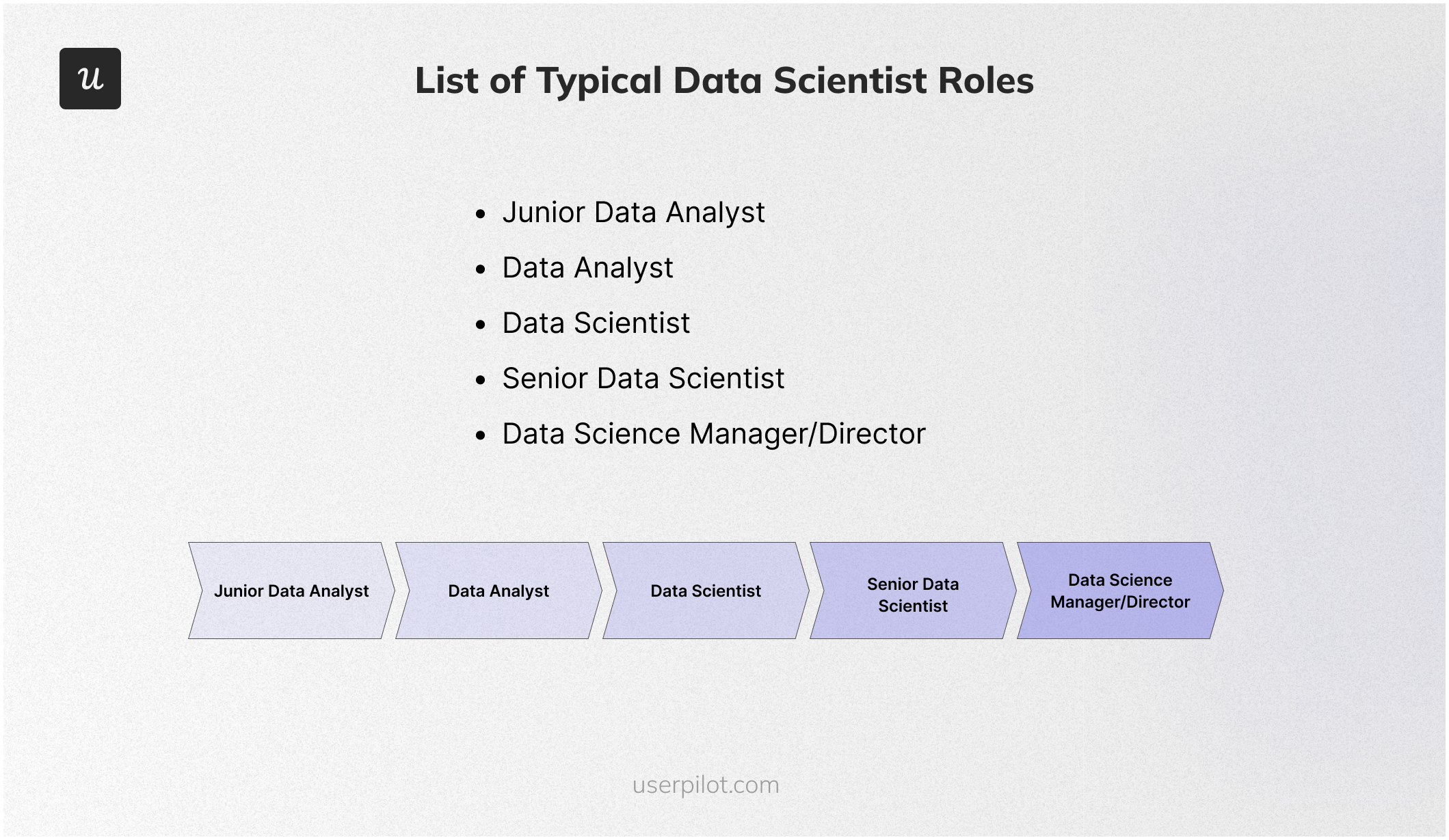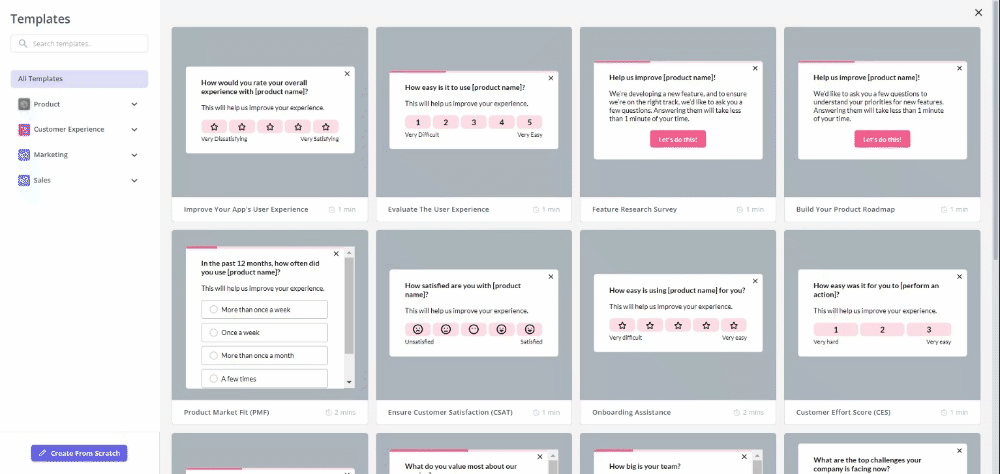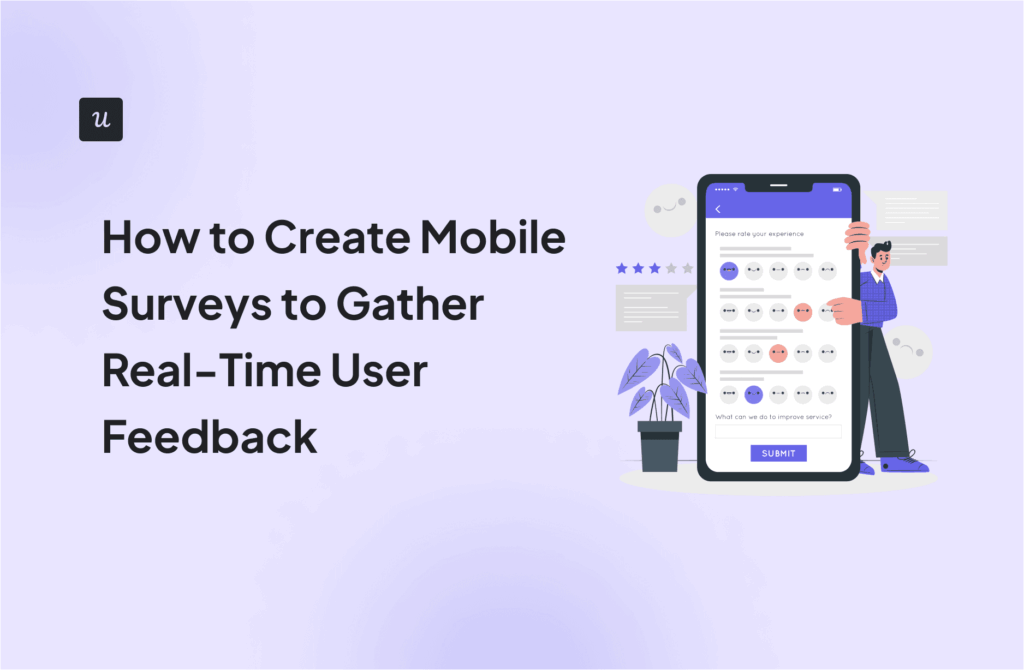![Data Scientist Salary [+ Resources to Advance]](https://blog-static.userpilot.com/blog/wp-content/uploads/2024/07/Data-Scientist-Salary-Resources-to-Advance-450x295.png)
Understanding the salary landscape for data scientists is crucial whether you’re entering the field or looking to advance your career.
In this guide, we’ll provide an overview of typical data scientist salaries, explore factors that can influence earnings, and share valuable resources to help you progress in your career.
Let’s get started!
Try Userpilot Now
See Why 1,000+ Teams Choose Userpilot

Overview of a data scientist salary
- A data scientist is someone who uses their knowledge of statistics, programming, and specific industry expertise to extract meaningful information from data.
- They are basically detectives who uncover hidden patterns and trends in data, which businesses can then use to make better decisions.
- Understanding the salary landscape for data scientists is essential for anyone considering this career path or looking to advance within it. The salary can vary significantly depending on the industry, reflecting the demand and the specialized skills required in different fields.
- Total Pay Range: $123K – $202K per year
- Base Pay: $90K – $140K per year
- Additional Pay: $33K – $62K per year
- To become a great data scientist, here are a few suggestions for you:
- Master the fundamentals
- No-code tool knowledge
- Think business first
- Embrace continuous learning
- Be a team player
- Looking into tools for data scientists? Userpilot is an all-in-one product platform with engagement features and powerful analytics capabilities. Book a demo to see it in action!
What is a data scientist?
A data scientist is someone who uses their knowledge of statistics, programming, and specific industry expertise to extract meaningful information from data. They are basically detectives who uncover hidden patterns and trends in data, which businesses can then use to make better decisions.
Data scientists are in high demand because more and more organizations are collecting massive amounts of data. This data can come from many sources, such as customer transactions, social media, and sensors. But just having a lot of data isn’t enough. Businesses need data scientists to make sense of it all and turn it into actionable insights.
Data scientist’s main responsibilities
The three responsibility pillars of a data scientist encompass Data Acquisition and Engineering, Data Analysis and Modeling, and Communication and Collaboration.
For a better understanding of this role, let’s break down the core responsibilities of a data scientist working in a SaaS company, for example:
1. Data acquisition and engineering:
- Data Extraction: SaaS products generate a ton of user data. Data scientists design and implement methods to extract this data from various sources within the SaaS application (e.g., user activity logs, product usage data). They may use APIs or write scripts to automate this process.
- Data Cleaning and Preprocessing: Raw data often contains errors and inconsistencies. Data scientists clean and prepare the data for analysis by identifying and handling missing values, outliers, and inconsistencies. This is crucial for building reliable models.
- Feature Engineering: Data scientists transform raw data into features that are informative for machine learning models. This may involve creating new variables, combining existing ones, and performing dimensionality reduction techniques.
2. Data analysis and modeling:
- Customer Segmentation: SaaS companies often have diverse customer bases. Data scientists use clustering algorithms to segment customers based on their behavior and characteristics. This helps personalize the user experience and target marketing efforts effectively.
- Churn Prediction: Customer churn is a major concern for SaaS companies. Data scientists build churn prediction models to identify customers at risk of leaving. This allows the company to take proactive steps to retain them (e.g., offering discounts, providing support).
- Recommendation Engines: Many SaaS products recommend content, features, or services to users. Data scientists develop recommendation engines using collaborative filtering or content-based filtering techniques to personalize recommendations and improve user engagement.
3. Communication and collaboration:
- Translating Insights to Action: Data scientists don’t work in isolation. They collaborate with product managers, marketing teams, and other stakeholders to translate their analytical findings into actionable business strategies. This might involve creating reports, dashboards, and presentations to communicate complex insights effectively.
- A/B Testing: Data scientists design and implement A/B tests to measure the impact of changes made to the SaaS product (e.g., new features, pricing models). This helps optimize the product for better user experience and conversion rates.
- Staying Updated: The field of data science is constantly evolving. Data scientists in SaaS need to stay updated on the latest tools, techniques, and industry trends to ensure their models remain relevant and effective.
How much does a data scientist make?

Understanding the salary landscape for data scientists is essential for anyone considering this career path or looking to advance within it. The salary can vary significantly depending on the industry, reflecting the demand and the specialized skills required in different fields.
- All Industries:
- Total Pay Range: $123K – $202K per year
- Base Pay: $90K – $140K per year
- Additional Pay: $33K – $62K per year
For example, in the Information Technology industry, data scientists can expect higher compensation, with total pay ranging from $174,000 to $260,000 per year. This is due to the technical expertise needed to handle complex data systems and algorithms.
In contrast, data scientists in the Media and Communication industry have a total pay range of $133,000 to $201,000 per year. While still lucrative, these roles often emphasize data interpretation and strategic insights tailored to media analytics and audience engagement.
Overall, the average salary for data scientists across all industries is around $156,557 per year. However, these figures can fluctuate based on specific industry requirements and additional pay components like bonuses and profit sharing. By breaking down salaries by industry, we can see the diverse opportunities and potential earnings for data scientists, helping professionals make informed career decisions.
Data scientist career path

Here’s a breakdown of a typical data scientist career path, with information on how to progress and the estimated experience needed for each level:
1. Junior Data Analyst (0-2 years): You’ll need a bachelor’s degree in a relevant field (statistics, computer science, etc.), strong analytical skills, and basic programming experience (Python, R). You can look for internships or entry-level analyst roles.
2. Data Analyst (2-4 years): This position often requires a solid foundation in data analysis methodologies and data manipulation skills. You should deepen your technical skills in programming languages (Python, R) and data analysis tools (SQL, machine learning libraries) or contribute to data science projects alongside senior data scientists.
3. Data Scientist (4-7 years): This is a core data science role requiring strong programming, statistical modeling, and problem-solving skills. At this point, you must master advanced machine learning algorithms and techniques like deep learning. It also matters to specialize in a particular industry or domain (e.g., finance, healthcare) or lead and mentor junior data scientists.
4. Senior Data Scientist (7+ years): This senior-level role demands extensive expertise in data science techniques and the ability to manage complex projects and teams. You can continuously learn about new technologies and trends in data science.
5. Data Science Manager/Director (10+ years): This leadership role requires extensive data science experience combined with strong business management and communication skills. For example, you’ll be in charge of setting the strategic direction for the data science function within an organization. You also take responsibility for overseeing budgets and resources for data science projects.
Best practices to be a great data scientist
To become a great data scientist, here are a few suggestions for you:
- Master the fundamentals: This might seem obvious, but a strong foundation in statistics, probability, linear algebra, and programming languages like Python (especially libraries like NumPy, Pandas, and scikit-learn) is crucial. These skills allow you to understand data, manipulate it effectively, and build robust models.
- No-code tool knowledge: While strong technical skills are important, familiarity with no-code data analysis platforms can be a plus. Tools like Userpilot, Amplitude, and Mixpanel allow even non-programmers to explore and visualize user behavior data. This can help understand user needs and inform data science projects.
- Think business first: Don’t get lost in the algorithms. Understand the business problem you’re trying to solve and translate it into actionable insights. Communicate your findings clearly and concisely to non-technical audiences.
- Embrace continuous learning: Data science is a rapidly evolving field. Stay up-to-date with the latest trends and technologies by attending conferences, reading industry blogs, and participating in online forums.
- Be a team player: Collaboration is key! Great data scientists can work effectively with cross-functional teams – engineers, product managers, and domain experts – to ensure projects have a business impact.
Best resources for data scientists
Data science is a rapidly evolving field, and staying updated with the latest trends, tools, and techniques is crucial for success. In this section, we’ll explore some of the best resources for data scientists, including books, blogs, and online courses, that can help you enhance your skills and stay at the forefront of the industry.
Best books for data scientists
Data science is a vast field, so the best books for you will depend on your experience level and area of interest. Here are some highly-rated books across different categories to kickstart your data science journey:
- Python for Data Analysis by Wes McKinney: This book is a fantastic introduction to using Python for data analysis. It covers the basics of Python programming, data structures, and popular data science libraries like NumPy, Pandas, and Matplotlib.
- Hands-On Machine Learning with Scikit-Learn, Keras & TensorFlow by Aurélien Géron: This book dives deeper into machine learning algorithms and their practical implementation using popular Python libraries like scikit-learn, Keras, and TensorFlow.
- Naked Statistics: Stripping the Dread from the Data by Charles Wheelan: This book makes statistics approachable and engaging, even for those with math anxiety.
- Thinking with Data by Nathan Yau: This book goes beyond the technical aspects of data science and explores how to think critically about data, ask the right questions, and communicate findings effectively.
- Data Science for Business by Foster Provost and Tom Fawcett: This book bridges the gap between data science and business. It explains how data science can be used to solve real-world business problems and provides case studies of successful data science applications.
Best webinars for data scientists
Are you looking to level up your data science expertise but are short on time? Webinars offer a fantastic way to learn from industry leaders and gain valuable insights in a concise format. Here’s a list of highly-rated webinars:
- Data Science Salon: Offers both live and recorded webinars on a wide range of data science topics, from fundamentals to cutting-edge applications. They also have an active community forum for discussions.
- BrightTalk: Hosts webinars on various tech topics, including a dedicated section for data science with a good selection of free and paid options.
- Userpilot webinars: Covers topics relevant to SaaS user research for informed product development. It’s a great source for anyone working for a SaaS business.
- Meetup: Local groups focused on data science often host online webinars on various topics. Check for meetups in your area or browse online groups relevant to your interests.
- Major tech companies like Microsoft, Google, and Amazon frequently host webinars on data science tools and applications related to their platforms. Check their developer portals or social media for upcoming events.
Best blogs for data scientists
To empower your learning journey as a data scientist, here’s a curated list of top data science blogs:
- Data Science Central: This comprehensive resource hub covers everything in data science, from analytics and machine learning to code and career advice.
- KD Nuggets: Known for its in-depth dives into specific data science topics and algorithms, KD Nuggets is a favorite among data professionals for staying sharp on the latest trends.
- Towards Data Science (on Medium): This massive online community publishes articles from a wide range of data science professionals. You can follow it to stay updated on the latest advancements and to find diverse perspectives.
- The Mockup Blog: Authored by Thomas Mock, a data science leader at Netflix, this blog offers valuable insights into the real-world applications of data science within companies.
- DataCamp Blog: This blog caters to aspiring and beginner data scientists with clear tutorials, project ideas, and career tips.
- Userpilot Blog: While not strictly a data science blog, Userpilot offers valuable insights on user behavior analytics, a crucial skill for data scientists working on product development and customer insights.
Best podcasts for data scientists
Based on insights from online reviews and discussions, here’s our favorite list of podcasts for data scientists at different experience levels:
- Lex Fridman Podcast: This isn’t strictly data science, but Lex Fridman’s interview format delves deep into AI and its connection to data science.
- Data Skeptic: A long-running favorite, Data Skeptic tackles a wide range of data science topics with a critical eye.
- Not So Standard Deviations: Hosted by statisticians Roger Peng and Hillary Parker, this podcast offers a deep dive into statistical methods used in data science.
- Making Data Simple: Hosted by AI VP at IBM, Martin AI, this podcast focuses on making complex data science concepts understandable for a broader audience.
- SuperDataScience: With short and long episodes, Kirill Eremenko’s podcast, SuperDataScience, covers a wide range of data science tools and techniques in a lighthearted and informative way.
Best tools for data scientists
Data scientists rely on a suite of powerful tools designed to collect, process, analyze, and visualize data. So here’s a list of the top tools that every data scientist should consider:
- Userpilot (Best for no-code product analytics): Userpilot is a no-code product analytics tool that helps product managers and data analysts understand user behavior and track product adoption. It provides features like metrics dashboards, reports (funnel, path, trend, cohort), user feedback, etc. This tool can help foster cross-team communication, bridging the gap between technical and non-technical teams.
- Tableau (Best for data visualization): Tableau is a data visualization tool that allows users to create interactive dashboards and reports. This can help data scientists identify trends and patterns in their data that would be difficult to see in a spreadsheet.
- Power BI (Best for business intelligence): Power BI is a business intelligence tool from Microsoft. It allows users to connect to a variety of data sources, create reports and dashboards, and share insights with others.
- Google Charts (Best for simple data visualization): Google Charts is a free data visualization tool from Google. It allows users to create a variety of charts and graphs, such as bar charts, line charts, and pie charts.
- Amplitude (Best for product analytics): Amplitude is a product analytics tool that helps businesses track user behavior and understand how users interact with their products. It provides features like funnels, user paths, and cohort analysis.
- Heap (Best for digital analytics): Heap is a digital analytics tool that automatically captures all user interactions on a website or app. This makes it a good option for businesses that want to track every user interaction, even if they don’t know what specific data points they are interested in yet.
- Mixpanel (Best for user behavior and predictive analytics): Mixpanel can help data scientists by providing them with a wealth of data on user behavior. This data can be used to improve product design, marketing campaigns, and overall user experience.
- Qualtrics (Best for survey research): Qualtrics can help data scientists by providing them with a way to collect data from a large number of people. This data can be used to identify trends and patterns in customer or employee sentiment.
- Optimal Workshop (Best for user research): Optimal Workshop is a user research tool that helps businesses conduct user testing and gather feedback from users. It provides features like card sorting, tree testing, and surveys.
- UserTesting (Best for user testing): UserTesting is a platform specifically designed for conducting remote user testing. Users can be recruited through the platform itself, allowing data scientists to gather feedback from a diverse range of people.
Conclusion
Now that you have a better understanding of the salary range for a data scientist position, you can take steps to improve your earning potential.
Consider pursuing relevant certifications, developing your skillset, or negotiating effectively during the job offer stage.
Looking into tools for data scientists? Userpilot is an all-in-one product platform with engagement features and powerful analytics capabilities. Book a demo to see it in action!








